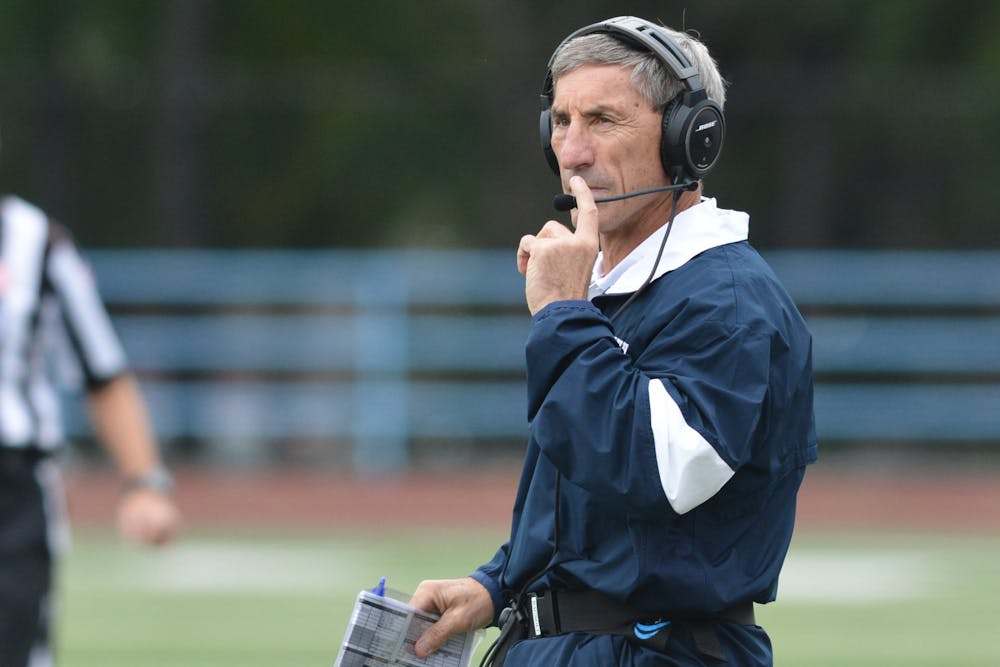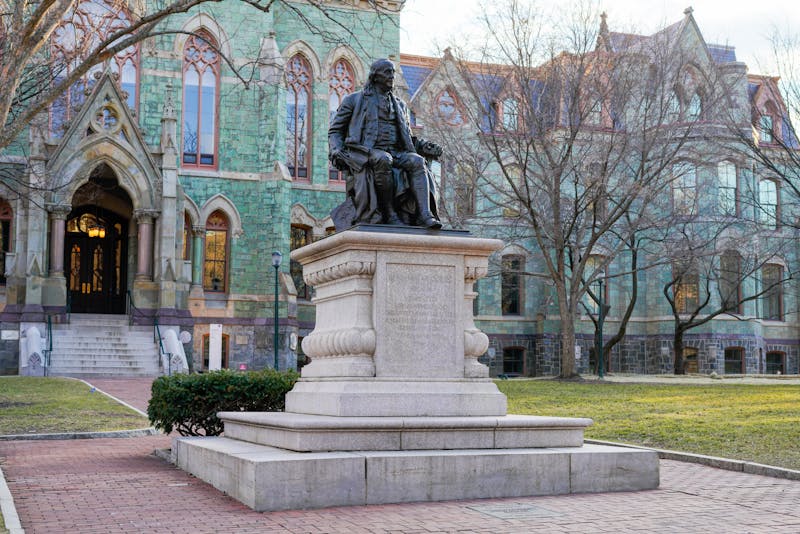
As Al Bagnoli looks back on his time coaching Penn football, one phrase that he continually repeats in his humble manner is “a little bit,” whether it’s in reference to what he did as a coach or what the team needed to change at a particular time. Make no mistake about it though: all the little bits that Al Bagnoli contributed to Penn football over the years made a bigger impact than anyone in the program's history.
In 1992, Bagnoli was hired as Penn football’s head coach and held the position for 23 years. Over that stretch, his teams went a combined 148-80 overall and 112-49 in the Ivy League, earning him records for most games coached, most games won, and most Ivy League games won in Penn football history. Bagnoli’s teams also won nine outright Ivy League titles, another program record, and he coached three undefeated teams in 1993, 1994, and 2003.
Under Bagnoli, Penn football displayed a high level of consistency with only three teams over his 23 years going under .500.
“Penn’s the same every week, every year,” former Columbia coach Pete Mangurian said after a loss to Penn. “I left the league in 2000, I came back in 2012, and they’re the same team. They just change the uniform and it’s the same guy on the sideline and they have the same attitude.”
Bagnoli attributes this continuity over the years to a distinct perspective in coaching up his players.
“You kind of approach it from very much a positive, in that you’ve got good players and you put them in a good place, coach them up, and you allow them to build and let them play to their strengths and let them play loose, let them play fast, and see what happens,” Bagnoli said.
His head coaching career began at Union College where, after being promoted from defensive coordinator to head coach in 1982, Bagnoli would go on to coach the Dutchmen for 10 seasons, all without a single losing record. Bagnoli then received heavy interest from Penn, where he was labeled by then Athletics Director Paul Rubincam as the Quakers' first choice in replacing former head coach Gary Steele.
After accepting the job, Bagnoli did not walk into an existing powerhouse. In the early-to-mid-'80s, the Red and Blue were a dominant force in the Ivy League, but they had not had a winning season since 1988, four year prior to Bagnoli’s arrival.
Although the situation seemed untenable in many respects, Bagnoli did not see the program as being in dire straits.
“Looking at a lot of little things, and collectively when you put it all together, it turned out to be pretty good, but there wasn’t a dramatic lack of talent or anything else,” Bagnoli said. “They had good players, and they just needed a little bit more guidance, a little bit more confidence, a little bit more structure, and fortunately, we were able to give it to them.”
The plan worked, as Bagnoli turned a 2-8 record into a 7-3 one in his first year without any of his own recruits, and he established a different culture for the program that would resonate for years to come.
“He is very demanding,” former Penn co-captain and linebacker Jim Hisgen said in 1999. “Even the days before a game he wants everything perfect so that you are ready to play for the game.”
This perfectionist mindset didn’t just extend to players though. Assistant coaches and staff were required to be on the ball as well.
“He made it very clear that there is an expectation for success,” former Penn wide receivers coach and current Columbia offensive coordinator Mark Fabish said in 2013. “It is not a switch that you hit on Saturday afternoon at 12:50 for a 1:00 kickoff. It is a buildup to that point.”
Bagnoli and the Quakers rode their 7-3 momentum into the following two seasons in '93 and '94, in which both teams went undefeated, thanks in large part to a shift in the entire atmosphere around the program.
“Coach instilled a new confidence in us when he came in,” former senior co-captain and running back Terrance Stokes said in 1994. “It was a breath of fresh air. Before, players were always down on themselves.”
One particular game during the 1993 season, though, was the real coming-out party for the formerly down in the dumps Penn team. Both Penn and Princeton entered a Nov. 6 matchup at Franklin Field undefeated. Even with the Tigers' impressive talent, the Quakers walloped their opponent by a score of 30-14, with star running back Stokes rushing for 272 yards on 42 carries.
“It was the biggest crowd we ever had during my tenure,” Bagnoli said. “We were almost at 40,000 people, and our kids were off the charts good.”
After the game, thousands of fans descended onto the field and tore down one set of goalposts while bending the other. It was a moment of jubilation that signified a new era of Penn football, which makes it apparent why Bagnoli sees it as one of the two most memorable games of his tenure.
The second one came in 2002 when ESPN’s College GameDay hosted its first ever show at a Football Championship Subdivision school, as Penn matched up against Harvard. Similar to the '93 game against Princeton, Bagnoli thought the team played tremendously in what was a high pressure game. Penn ended up throttling the Crimson, 44-9, as quarterback Mike Mitchell threw four touchdown passes to lead the Quakers to victory.
Big wins like these two were no longer as elusive as they were under former head coach Steele. Bagnoli brought an energy and a football expertise to the program that allowed for huge victories to put Penn back on the map.
“Al can look at a film and come up with a scheme to beat anyone,” La Salle Institute coach John Audino, who worked under Bagnoli as an assistant both at Union and at Penn, said in 1994. “He’s as good as anyone around at identifying what you have to take away and where you can afford to give something up. He recognizes opportunities quicker than most, and only needs a play or two to exploit them.”
Despite Bagnoli having this intelligence for the game, he never restricted game planning and strategic duties from his assistant coaches or his players; he let them grow into people that were prepared to take the next step in their careers and help the team in the most effective way possible.
"He's not a person that sits over your head and everything else," former Penn defensive coordinator and current Penn head coach Ray Priore said in 2001. "He allows the coaches and the players to go out there and play and do some positive things."
By the end of that 2002 season in which Penn beat Harvard in their GameDay debut, Bagnoli’s Quakers had won five Ivy titles and had cemented themselves as the powerhouse they once were in the '80s. A number of factors went into this drastic improvement in the program and the success it would have in the future. One aspect of it was a competitive drive that fueled everything around the team.
“We wanted to really make things competitive, whether it was in the weight room or on the running track or at practice” Bagnoli said. “We always tried to do something that would challenge our kids from a competitive viewpoint because our kids were tremendous competitors and didn’t like to lose at anything, so we tried to put as much of that ads we possibly could in there.”
Much of the competitive attitude that Bagnoli chose to coach his teams also came from his own personality.
“He is extremely competitive,” former Penn defensive coordinator and current United States Merchant Marine Academy head coach Mike Toop said in 1999. “If you go play racquetball with him or go play golf with him, you better go play to win. There are a few trees on golf courses on the East Coast that have dents from his golf clubs. I will guarantee that. That is the type of person he is and it reflects into his coaching style. That is why he has the record he does.”
After he retired from coaching Penn football in 2014, Bagnoli accepted the head coaching gig at Columbia, where he still regularly faces off against coachPriore. Bagnoli described the initial meetings between his old squad and his new squad as awkward, given that three of his four recruiting classes were on the opposing sideline, but also said they have become less so over the years. He also says that he’s kept in contact with Priore and has maintained a good relationship with Penn’s assistant coaches as well.
On the field, Bagnoli’s legacy is unquestionable, but Priore has said that his accomplishments off the field are meaningful as well.
“He’ll go down as the winningest coach in Penn history,” Priore said in 2013. “But he’s been able to be honest with kids, be up front with kids. Kids have done the job in the classroom, graduated, and become great family people.”
Bagnoli contributes his success to those around him — the players, the assistant coaches, the alumni, and the administrators. He doesn’t want to personally label or classify his tenure, but he wishes for his time with the Red and Blue to have a specific legacy.
“Hopefully, when they look back at it, they say, ‘Yeah, he just carried on and did his part to help a really successful program through the '80s remain pretty competitive through the '90s and 2000s until he turned the rein over to Coach Priore, who then in turn, did a really nice job as well,” Bagnoli said.
It would be hard to argue against that sentiment, as Al Bagnoli’s success over 23 years of coaching Penn football makes him undoubtedly one of the most consequential figures in Penn football history.
The Daily Pennsylvanian is an independent, student-run newspaper. Please consider making a donation to support the coverage that shapes the University. Your generosity ensures a future of strong journalism at Penn.
Donate






